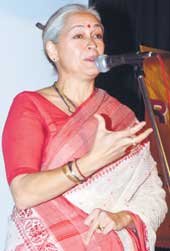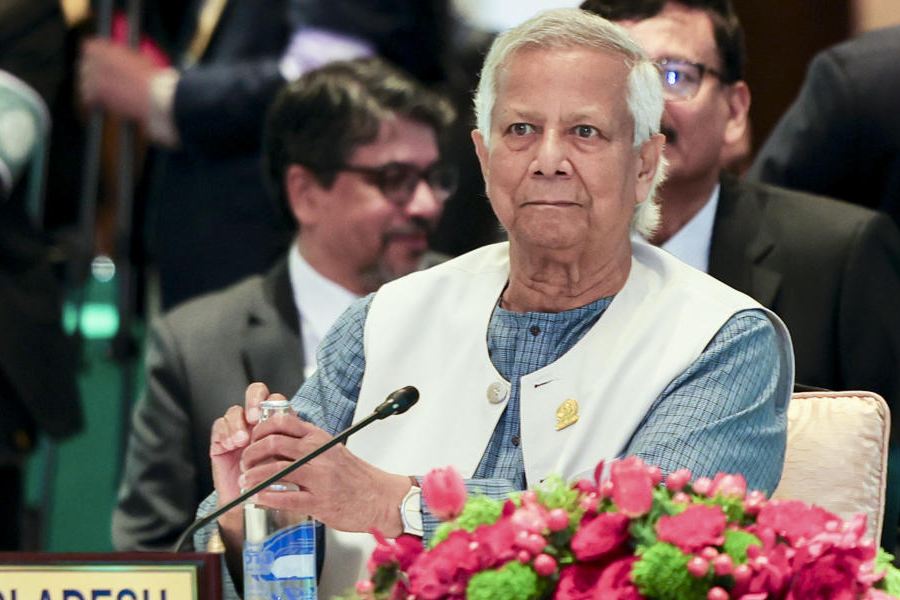 |
| ALL FOR IT: Nafisa Ali attending a meet on the right to information in Calcutta |
The story of a slum dweller in Mumbai is the stuff that legends are made of. He had filed an application for a ration card but decided against paying a bribe for it. “You’ll never get it,” people told him, for the going rate for a ration card bribe in that area was somewhere around Rs 2,000.
The would-be ration card owner went ahead and filed an application under the Right to Information Act, asking how many people had been given their ration cards ahead of him, despite having presented their forms after he had submitted his papers. He got his ration card.
The ration card episode, activists hold, is an important outcome of the Right to Information (RTI) Act which came into effect on October 12, 2005. What’s not as known is the flip side of the law ? an issue that brought supporters of the Act, as well as some careful dissenters, to a seminar in Dehra Dun last week.
That the RTI is a landmark Act, activists stress, is an established fact. “The right to information is a fundamental right,” says Justice Surya Kant of the Punjab and Haryana High Court. And access to information is directly linked to the freedom of expression.
Those were the considerations that gave momentum to the movement for the right to information, spearheaded by activist Aruna Roy and her Rajasthan-based Mazdoor Kisan Shakti Sangathana. The Act gives any citizen of India the right to seek information from the government on any subject, barring what the government considers “sensitive” subjects that include national security and issues that could cause a breach of privilege of Parliament or state legislatures.
But supporters of the Act believe that the time has come to critically look at the law and bring about some changes. Some of the problems are functional ones that can be sorted out; some, they stress, need widespread consultations. “We need to have an awareness campaign on this,” says Vinay K. Dharmadhikari, a scientist at the Central government’s department of information technology.
One of the serious issues of concern voiced by many is the fear that bureaucrats may ride roughshod over the law and take over the commissions set up to facilitate its use. “It is clearly stated in the Act that public servants and administrators come at the end of the list of appointees for the state chief information commissioners,” says Avdhash Kaushal, the head of the Dehra Dun-based Rural Litigation and Entitlement Kendra (RLEK), the organisers of the seminar. “However, in a state like Uttaranchal there is not even a single appointment of a person of eminence in public life other than bureaucrats,” he says.
Members of the government, too, believe that there is a need for bringing in people other than bureaucrats and politicians into the ambit of national or state-level commissions.
For 50 long years, the establishment in India had its system of safeguarding information. And though it’s too early for the Act to bring about change, most experts on the right to information believe that not every state is willing to share information with what it sees as a common applicant.
Several government departments don’t have a “single window” for those hoping to file an application under the RTI Act. The National Campaign for People’s Right to Information, a New Delhi-based organisation, pointed out to the National Advisory Council earlier this year that several departments had multiple public information officers (PIO), which meant that an applicant had to run from pillar to post to get to the concerned authority.
The Act states that there should be people dedicated to the RTI in every department. But Justice Surya Kant points out that there are many cases where government employees do the work of information officers while attending to their earlier duties. “We need a separate cadre to deal with this,” he says.
Clearly, not everybody is keen on transparency. “The Official Secrets’ Act has led to the establishment of a close, intimidating structure,” says Faizan Mustafa, registrar, Aligarh Muslim University (AMU). On the other hand, there is the issue of opening the floodgates with the enactment of the RTI Act. People have been flooding various departments of the government with applications for information on diverse topics. At the AMU itself, Mustafa has had to cope with a questioner who wanted to know everything about appointments since 1976: who had been appointed, who had been rejected and why. Another person wanted to know where AMU printed its question papers. “And this is obviously something that we can’t divulge,” Mustafa says.
The law, many believe, needs to be tweaked for better use. And one of the ways of doing that is by bringing some of the lacunae to light ? which is what the Act itself seeks to do. “After all, sunlight is the best disinfectant,” says Mustafa.











